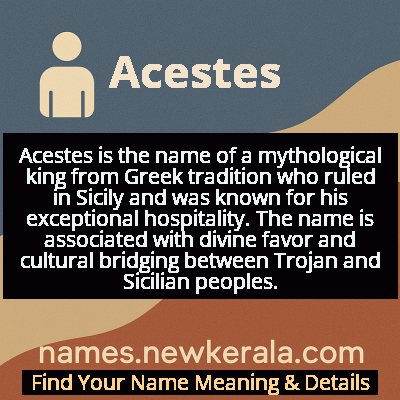Acestes Name Meaning & Details
Origin, Popularity, Numerology Analysis & Name Meaning of Acestes
Discover the origin, meaning, and cultural significance of the name ACESTES. Delve into its historical roots and explore the lasting impact it has had on communities and traditions.
Name
Acestes
Gender
Male
Origin
Greek
Lucky Number
9
Meaning of the Name - Acestes
Acestes is the name of a mythological king from Greek tradition who ruled in Sicily and was known for his exceptional hospitality. The name is associated with divine favor and cultural bridging between Trojan and Sicilian peoples.
Acestes - Complete Numerology Analysis
Your Numerology Number
Based on Pythagorean Numerology System
Ruling Planet
Mars
Positive Nature
Generous, passionate, energetic, and humanitarian.
Negative Traits
Impulsive, impatient, moody, and can be overly emotional.
Lucky Colours
Red, maroon, scarlet.
Lucky Days
Tuesday.
Lucky Stones
Red coral, garnet.
Harmony Numbers
1, 2, 3, 6.
Best Suited Professions
Military, sports, philanthropy, leadership roles.
What People Like About You
Courage, energy, leadership, generosity.
Famous People Named Acestes
Acestes
Mythical King of Segesta
Provided refuge to Aeneas and the Trojan survivors in Sicily
Acestes
Mythical Archer
Performed the miraculous flaming arrow shot during funeral games
Acestes
Mythical Founder
Established Sicilian settlements with mixed Trojan-indigenous population
Name Variations & International Equivalents
Click on blue names to explore their detailed meanings. Gray names with will be available soon.
Cultural & Historical Significance
Extended Personality Analysis
The personality of Acestes as depicted in classical sources reveals a complex leader characterized by practical wisdom, spiritual sensitivity, and exceptional diplomatic skill. His most prominent trait is profound hospitality, demonstrated when he welcomes the exhausted Trojan refugees without hesitation, providing them shelter, resources, and emotional support. This suggests a personality marked by empathy and generosity. The miraculous arrow incident reveals his connection to the divine and his acceptance of supernatural signs, indicating spiritual awareness and humility before higher powers. As a ruler, he demonstrates political acumen by maintaining stability in his kingdom while navigating complex relationships with both indigenous populations and foreign visitors. His ability to facilitate the funeral games for Anchises shows organizational skill and respect for tradition. Acestes embodies the ideal of the philosopher-king who rules with compassion while remaining attuned to both practical governance and spiritual realities.
Modern Usage & Popularity
In contemporary times, the name Acestes remains exceptionally rare and is primarily confined to academic and literary contexts. It has never appeared in official baby name registries or popularity charts, making it one of the least used mythological names. Modern usage is typically limited to classical scholarship, historical fiction, and occasional appearances in works retelling Greek and Roman myths. The name's strong association with a specific mythological narrative and its ancient Greek linguistic structure make it challenging for modern parents seeking names for children. However, it occasionally surfaces in Italian communities, particularly in Sicily where the historical connections to Segesta maintain cultural relevance. The name's rarity makes it appealing to classical enthusiasts seeking unique mythological names, though its unfamiliar sound and spelling present barriers to widespread adoption.
Symbolic & Spiritual Meanings
Acestes carries rich symbolic meanings centered around themes of hospitality, divine intervention, and cultural mediation. His welcoming of Trojan refugees symbolizes the sacred duty of providing sanctuary and the moral obligation to assist those in distress. The miraculous flaming arrow represents the transformation of ordinary human effort into extraordinary achievement through divine favor, symbolizing moments when dedication and skill are blessed with supernatural significance. As a ruler of mixed heritage governing in Sicily, he embodies the successful integration of different cultures and the creation of harmonious societies from diverse elements. His stable kingdom amidst Mediterranean turmoil symbolizes the possibility of maintaining peace and order while engaging with wider historical currents. The arrow's transformation from ordinary weapon to divine sign particularly represents how human actions can acquire deeper meaning when aligned with higher purposes or historical missions.

